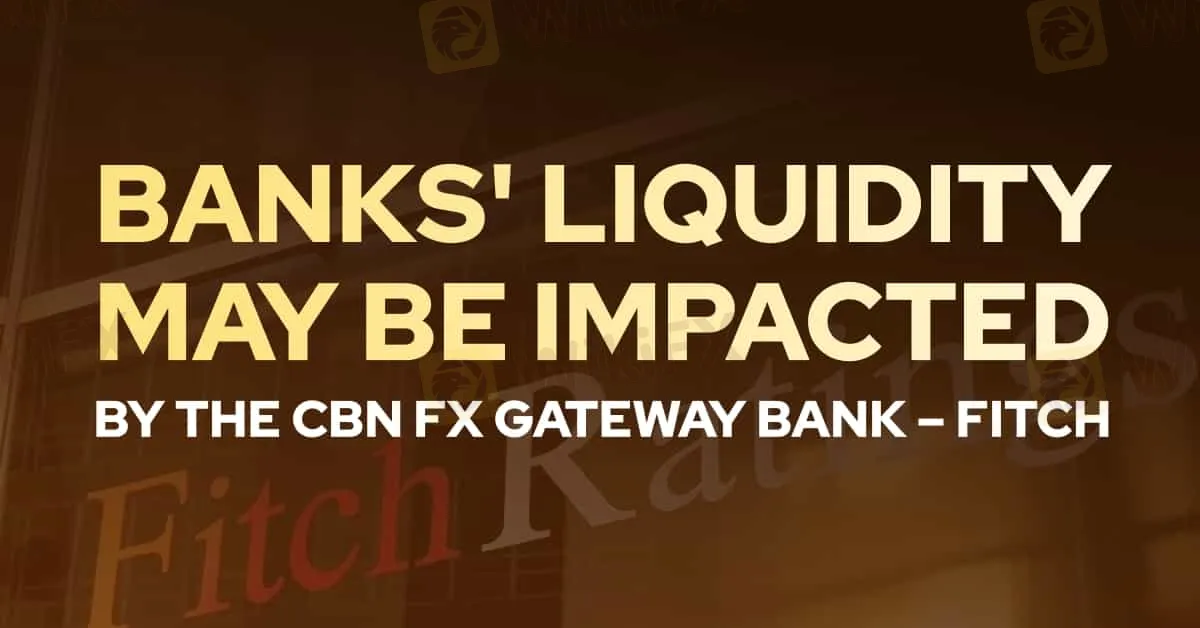简体中文
繁體中文
English
Pусский
日本語
ภาษาไทย
Tiếng Việt
Bahasa Indonesia
Español
हिन्दी
Filippiiniläinen
Français
Deutsch
Português
Türkçe
한국어
العربية
BANKS' LIQUIDITY MAY BE IMPACTED BY THE CBN FX GATEWAY BANK – FITCH
Abstract:According to credit Ratings, the Central Bank of Nigeria's proposed foreign currency gateway bank could negatively impact the liquidity of Nigerian banks.

According to credit Ratings, the Central Bank of Nigeria's proposed foreign currency gateway bank could negatively impact the liquidity of Nigerian banks.
This was revealed in the most recent Fitch Ratings examination of Nigerian banks.
The governor of the apex bank, Dr. Olayemi Cardoso, has announced plans to create a new foreign currency gateway bank in an effort to ease the country's FX issues.
In a televised interview, Cardoso discussed the CBN's plans and said, “Introducing a single FCY gateway bank to centralise all correspondent by two major banks in the corresponding banking space.”
The CBN's medium-term plan, aims to solve Nigeria's ongoing FX issues by centralizing all correspondent banking activities.
In response, Fitch Ratings said, “The Governor of the CBN, Yemi Cardoso, said that there are plans to establish an FC gateway bank with the intention of centralizing correspondent banking activities.” “A recent audit found $2.4 billion of past-due FX forwards invalid.” Fitch believes that the CBN's policies may negatively affect the banking sector's FC liquidity.
Meanwhile, due to the nearly 70% depreciation of the local currency since the end of 2022, Fitch forecasts that bad loans to the banking sector would climb faster than the devaluation. Due to the devaluation, which has increased the already significant ratio of gross loans to core capital and FC-denominated problem loans (Stage 2 and Stage 3 loans, mostly from the oil and gas sector), Fitch predicts that the banking sector's impaired loans (Stage 3 loans) will rise more quickly than it did before.
The CBN circular, which prohibits banks from holding net long foreign currency positions, is expected to result in a further modest depreciation of the naira, according to Fitch.
Not only has the Central Bank of Nigeria issued new circulars, but also depreciated its currency. Following the devaluation, a circular was issued on January 31 which prohibited banks from having net long FC holdings, and set February 1 as the compliance date.
Net long FC positions have mitigated the impact, including the most recent one, on capital ratios because they generate advantages from foreign-exchange revaluation, which buffer the impact of increased FC-denominated assets.
According to the research, banks' capital positions are now more susceptible to Fitch's prediction of a further little depreciation of the naira in net long FC positions, even if total capital adequacy ratios (CAR) regulate minimum norms.
The CBN harmonized the several FX market divisions in June, which caused the naira to come down.
Last year, the local closed for 899/$ at the official market.
The naira saw a second devaluation, according to Fitch, with its value as of February 13 standing at 1,516/$, or around 40% loss.
This exceeded Fitch estimate for 2024. The second in a year—has caused the official exchange rate and the parallel market rate to converge. The continued move away from a long-standing system of beneficial in increasing capital inflows and reducing foreign currency shortages, which have recently impeded economic growth.
However, short-term macroeconomic problems, such as drawing attention to the already inflation (December 2023: 29% year over year), which could impede economic growth and put more pressure on the capital and credit quality of the banking industry.
On Friday, the dollar was sold for 1,537/$ in the official window. It was trading for 1,590/$1 on the parallel market, 1.57 percent less than its closing price of 1,565/$.

Disclaimer:
The views in this article only represent the author's personal views, and do not constitute investment advice on this platform. This platform does not guarantee the accuracy, completeness and timeliness of the information in the article, and will not be liable for any loss caused by the use of or reliance on the information in the article.
Read more

The Ultimate Guide to Automated Forex Trading in 2025
Modern markets are revolutionized by automated trading systems, which now execute 70-85% of all transactions. These advanced automated trading software solutions, commonly called trading robots or Expert Advisors (EAs), leverage algorithmic precision for automatic trading across forex, stocks, and commodities 24/7. By removing emotional interference and executing trades in microseconds, auto forex trading platforms create fair opportunities for all market participants. For those new to automated trading for beginners, these systems provide disciplined, backtested strategies while significantly reducing manual effort.

How Reliable Are AI Forex Trading Signals From Regulated Brokers?
Discover how reliable AI Forex trading signals are and why using a regulated broker boosts their effectiveness. Learn key factors to evaluate accuracy and enhance your trading.

Top Currency Pairs to Watch for Profit This Week - March 31, 2025
Discover the top 5 currency pairs to trade for profit this week, March 31, 2025—USD/JPY, EUR/USD, GBP/USD, AUD/USD, USD/CHF—with simple strategies and best times.

AI-Powered Strategies to Improve Profits in Forex Trading
Boost Forex profits with AI: predictive analytics, real-time automation, and smart risk management strategies for sharper trades and fewer losses.
WikiFX Broker
Latest News
How Crypto Trading Transforms FX and CFD Brokerage Industry
UK would not hesitate to retaliate against US tariffs - No 10 sources
FCA Warns Against 10 Unlicensed or Clone Firms
CySEC Warns Against 14 Unlicensed Investment Websites
Top Currency Pairs to Watch for Profit This Week - March 31, 2025
Will natural disasters have an impact on the forex market?
Philippines Deports 29 Indonesians Linked to Online Scam Syndicate in Manila
Navigating the Intersection of Forex Markets, AI Technology, and Fintech
Exposed: Deceptive World of Fake Trading Gurus – Don’t Get Fooled!
AI-Powered Strategies to Improve Profits in Forex Trading
Currency Calculator







